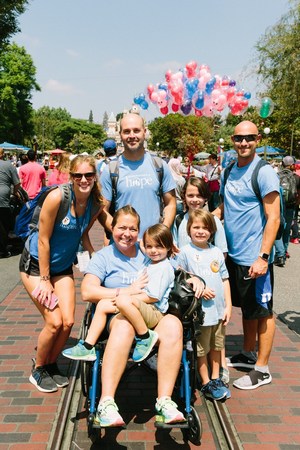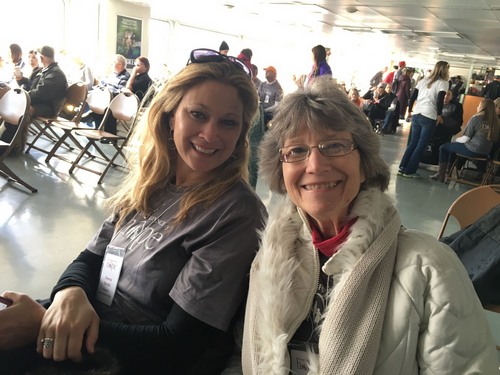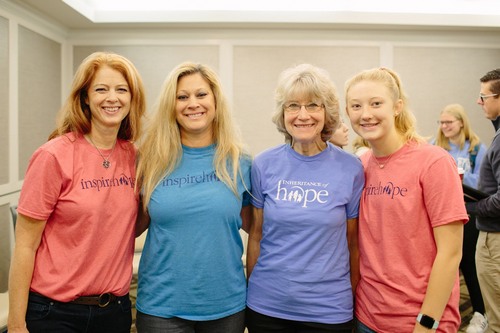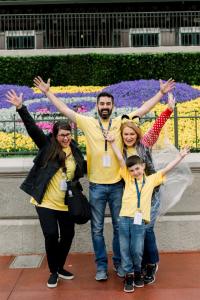Since the Strebe family attended an Inheritance of Hope Legacy RetreatⓇ in February 2014, Jon and Donna have only missed a handful. Between the two of them, they have volunteered at 12 retreats. That’s worth repeating–a dozen Legacy Retreats!
 |
| The Strebe family at their Legacy RetreatⓇ in February 2014 |
The young family arrived in Orlando carrying suitcases packed with “Godstrong” T-shirts made by friends, and maybe just a little more baggage. How could they not? For as Donna explained, “Life is never the same after a diagnosis like Jon had.”
Although they never wavered in their faith during Jon’s treatment for germ cell cancer, they were admittedly worn out and anxious. At the first group sessions, Donna dropped off the kids and worried to the preschool room volunteers, “We are THAT family–the ones whose kids have runny noses and food allergies, and we are just a hot mess.” Luke was barely five years old, and twins Emma Kate and Ryan were three. By the end of the weekend, it was clear to the Strebes, THAT family is who we all are at IoH–people doing our best to love each other with the courage to be honest.
 |
| Making memories at Disney |
Jon and Donna use their experiences as a cancer survivor and caregiver to share that same love with new IoH families. In a recent interview, Jon told IoH that his insight allows him the opportunity to easily and instantly connect with retreat attendees. “I am humbled, and so grateful for the opportunity to serve, and that I am able to serve. We all have a unique perspective. Everyone can touch lives and sympathize, but an even smaller number can empathize. Those of us who have been on retreats as diagnosed parents and caregivers can cross that bridge.”
Below, read our Q&A with the Strebes to see their advice for families facing the life-threatening illness of a parent.
What do you know now, that you wish you had known at the time of your diagnosis?
Jon: You have to be proactive, and that was one thing Donna was so good about. If it hadn’t been for her, I wouldn’t have asked questions. I think the one thing we learned is that you have to advocate for yourself. No one is going to do that for you.
More times often than not, people just do what the doctor says even if they don’t understand. You have to educate yourself, ask tough questions, and get out of your comfort zone. I wish I could have done that from the start, but am grateful Donna stepped in and did it for me.
Seek out the best treatment. The first round of chemo didn’t work for me, so we sought out a second opinion that let us to a different doctor and a different treatment.
Donna: I just kept looking and asking questions. I didn’t want to have regrets that we should have done one more thing.
You obviously have a very strong faith. How did you keep that through the toughest times?
Donna: I go to God and try to find where He is in the situation. He showed up everywhere for us, and you couldn’t deny it. He was there showing us what to do and gave us more time to spend with Him.
Jon: I was brought up in a Christian community with the kind of faith that God is with us in the storm even when we can’t see through to the end of it. While it was still hard to go through the deepest darkest places, I felt that God was in complete control. We don’t know why or how we will go through the storm, but we have to trust Him to go with us.
And, what else do you do but fight? You fight for your kids. We moved to Indiana for my treatment, and while we were there, every single morning I would see them in their three little highchairs eating breakfast and I remember saying, “I’m fighting for you today.” I remember that clear as day. I was not going to lose the battle because of my lack of faith.
How did (and do you) deal with “scanxiety” and worrying between appointments?
Donna [laughing]: Oh, we suppress it until two weeks before, then start freaking out. By the time we are at the doctor’s office we’ve totally freaked out. No matter how good things have been going, once the doctor enters the room, there is a 50-50 chance that we are either going to go back to our normal life, or our life is going to be completely turned upside down. Life is never the same after a diagnosis like Jon had.
Jon: In the moment, lots of people don’t want to talk, but it does help to be able to verbalize what you are going through and to have a community. IoH helps with both of those things. While the experiences will be unique to each person, having someone who can empathize with you is huge.
Tell us more about what the retreat meant to you:
Jon: I will always remember coming back from that retreat. Everyone asked how it was. I kept coming back to “I’ve never been treated the way I was treated those [retreat] days, and never will be again.” And it’s true. From the minute you step on the property and know you are loved, every single need is taken care of and taken off your shoulders. It’s such a neat experience–you can never, ever, quantifiably prepare another family for what they are about to go through.
What was impactful for me was sharing with someone who truly gets it. At the retreat, you can share what you are feeling and going through, and the person on the other end can say, “I understand because I lived it.” Having that kind of outlet helps get through to the other side.
Donna: You can only forget about the illness for so long. It is the proverbial cloud hanging over your head, and you can’t get away. There is always something holding you back from enjoying things. But having other people who understand gives a release to that pressure valve.
Donna, what would you say to other caregivers?
Donna: It’s just hard. I killed myself to make my kids happy, and to be with Jon. I didn’t want to leave him alone but I wanted to be a mom still and make the kids feel as normal as possible.
My advice would be to accept the love you receive and the love your family receives. No one wants help; everyone wants to do it themselves, but you can get yourself in trouble that way. There is simply too much to manage. Humble yourself enough to accept help. If you don’t, you will run yourself into the ground. Even if you don’t think you need it, you do. It’s hard–one of the hardest things for anybody–no one wants other people up in their business, but you have to open up.
You came back to volunteer only months after you were served by IoH yourselves. What made you volunteer, and why do you keep coming back?
Jon: The experience our family was given as we were served back in 2014 jump started our love and passion for IoH. During the retreat, we were blown away. I remember telling Donna while we were in Orlando that I felt like we didn’t deserve it. We realized what IoH is doing is amazing–families make memories they wouldn’t have otherwise. Our neighbors recently went on the Colorado trip, and when we were trying to explain what it is like before they left, it wasn’t just about “you need this trip,” but more like, “you are going to fall in love with this organization.” So many people go and want to give back.
 |
| Jon (right) paying it forward to other families in California |
I remember when I was diagnosed, Donna said that everyone deals with this differently. Yeah, I had a pity party for a week, but then I knew God would use this situation. That was our heart from day one. We didn’t want it to go to waste, and wanted to share what we could. In some shape or form, what I went through can help others. Serving with IoH is an extension of that. We can continue to use our story.
Donna: For me, it is just one way of staying in the cancer community. I want to help as many people as I can because it is such an awful time. When Jon was diagnosed, we knew no one. We knew of one person’s brother. Now we know so many people. We love serving and trying to encourage others during a really awful time. And, it’s so neat to see the relationships and bonds you make.
 |
| Donna and her mother, Martha, serving in NYC |
What advice do you have for families who are coming on an IoH retreat?
Jon: Let your guard down. We all have lots of levels of walls. Take down those walls as fast as you can. The quicker you do it, the more you will get out of it. It never ceases to amaze me when the walls come down, it is as if everyone has known each other for years, but it is really only a few hours. That is the magic of IoH, and it never, ever ceases to amaze me. Truly enjoy the unique opportunity and let the love of God and the love of IoH wash over you.
 |
| Donna’s sister, Karen (left), and niece, Mikayla (right), joined Martha and Donna at our NYC Legacy RetreatⓇ in 2018 |
A few years ago, we featured a story about Donna and her mom Martha Nunnally, who meet up every November to volunteer on the NYC retreat. This past November, Donna’s sister and niece also joined the ranks as volunteers in the IoH Family. At IoH, we give thanks not only for Jon’s health, but also for what the extended Strebe family means to the extended IoH family.
Angie Howell graduated from Davidson College, where she met Kristen Grady Milligan the first week of their freshman year. Kristen eventually started Inheritance of Hope with her husband Deric, and Angie heard about their work at a college reunion. In 2010, the two former hallmates got back in touch, and Angie became involved in IoH shortly afterwards. She has served as a Legacy Retreat volunteer, Coordinator, and now, as Communications Manager, Angie helps tell the stories of IoH. She is constantly inspired by the people she meets in the IoH family.

